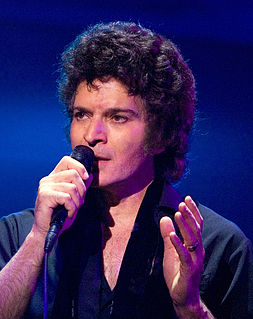Related Research Articles

Disco is a genre of dance music and a subculture that emerged in the 1970s from the United States' urban nightlife scene. Its sound is typified by four-on-the-floor beats, syncopated basslines, string sections, horns, electric piano, synthesizers, and electric rhythm guitars.

The twelve-inch single is a type of vinyl gramophone record that has wider groove spacing and shorter playing time with a 'single' or a few related sound tracks on each surface, compared to LPs which have several songs on each side. This allows for louder levels to be cut on the disc by the mastering engineer, which in turn gives a wider dynamic range, and thus better sound quality. This record type is commonly used in disco and dance music genres, where DJs use them to play in clubs. They are played at either 33+1⁄3 or 45 rpm. The conventional 7‐inch single usually holds three or four minutes of music at full volume. The 12‐inch LP sacrifices volume for extended playing time. In the 1970s, a hybrid was created, the 12‐inch single.
Because it is a modern cosmopolitan society, in the present day all types of music can be found in the Canadian province of Quebec. Particular to this area are its traditional Quebecois songs, a local variety of Celtic music, and the traditional music of local First Nations and the Inuit.

Vicki Sue Robinson was an American theatre and film actress, and singer, closely associated with the disco era of late 1970s pop music; she is most famous for her 1976 hit, "Turn the Beat Around".
Pauline Julien,, nicknamed "La Renarde", was a singer, songwriter, actress, feminist activist and Quebec sovereigntist.
LGS standing for Le Groupe Swing is a Canadian néo-trad band of Franco-Ontarian origins. The band started as Swing before change of name in 2017. The two main members of Swing are Michel Bénac and Jean-Philippe Goulet.

Louise Forestier is a Canadian singer, songwriter and actress.

Gino Vannelli is a Canadian rock singer and songwriter who had several hit songs in the 1970s and 1980s. His best-known singles include "I Just Wanna Stop" (1978), "Living Inside Myself" (1981) and "Wild Horses" (1987).
CKMF-FM is a French-language Canadian radio station located in Montreal, Quebec.

Ginette Reno is a Canadian author, composer, singer, and actress. She has received nominations for the Genie and Gemini Awards and is a multi-recipient of the Juno Award. She is a gold and platinum selling Canadian musician.
Claude Gauthier is a Quebec singer-songwriter and actor.

Michel Louvain, was a Canadian singer most popular in the 1960s and 1970s. He recorded many hit songs, and also worked as a host for a variety of shows on television and radio. In 1965 he was voted 'Mr. Radio–TV', Radio Canada's top show business personality, at the Gala des Artistes.

Funkytown is a 2011 Canadian drama film directed by Daniel Roby and written by Steve Galluccio. starring Patrick Huard, Justin Chatwin, Paul Doucet, Sarah Mutch and Raymond Bouchard.
Alain Montpetit was a television and radio personality in Quebec, as well as an actor.

Christine Charbonneau was a French Canadian singer and songwriter.
A chansonnier was a poet songwriter, solitary singer, who sang his or her own songs (chansons) with a guitar, prominent in francophone countries during the 1960s and 1970s. Unlike popular singers, chansonniers need no artifice to sing their soul poetry. They performed in «Les Boites à Chansons». which flourished during those years. The themes of their songs varied but included nature, love, simplicity, and a social interest to improve their world.

Quebec City Film Festival is a film festival held annually in September in Quebec City, Quebec, Canada. It screens short and feature films and premieres movies from all over the world.
Patrice Laliberté is a Canadian film and television director and screenwriter from Quebec. He is most noted for his 2015 short film Overpass (Viaduc), which won the Toronto International Film Festival award for Best Canadian Short Film at the 2015 Toronto International Film Festival and was a shortlisted Canadian Screen Award nominee for Best Live Action Short Drama at the 4th Canadian Screen Awards.
The Prix Iris for Best Original Music is an annual film award, presented by Québec Cinéma as part of its Prix Iris awards program, to honour the year's best music in films made within the Cinema of Quebec. Unlike some other film awards, which present separate categories for scores and songs, the Prix Iris only presents a single music category inclusive of both types of film music.
The Prix Iris for Best Editing is an annual film award presented by Québec Cinéma as part of the Prix Iris awards program, to honour the year's best sound in feature films made within the Cinema of Quebec. Unlike some film awards, Québec Cinéma does not present separate awards for overall sound and sound editing, but instead honours the full sound team in a single category; however it does also present a distinct category for Best Sound in a Documentary.
References
- Duchesne, André, "La face cachée de la boule miroir", La Presse (Montreal, Quebec), 29 January 2011, p. CINEMA7
- Fred Dompierre, Jean Kohnen (dir.) "Michèle Richard: la série complète [documentary film]", Montréal: Musimax, 2004.